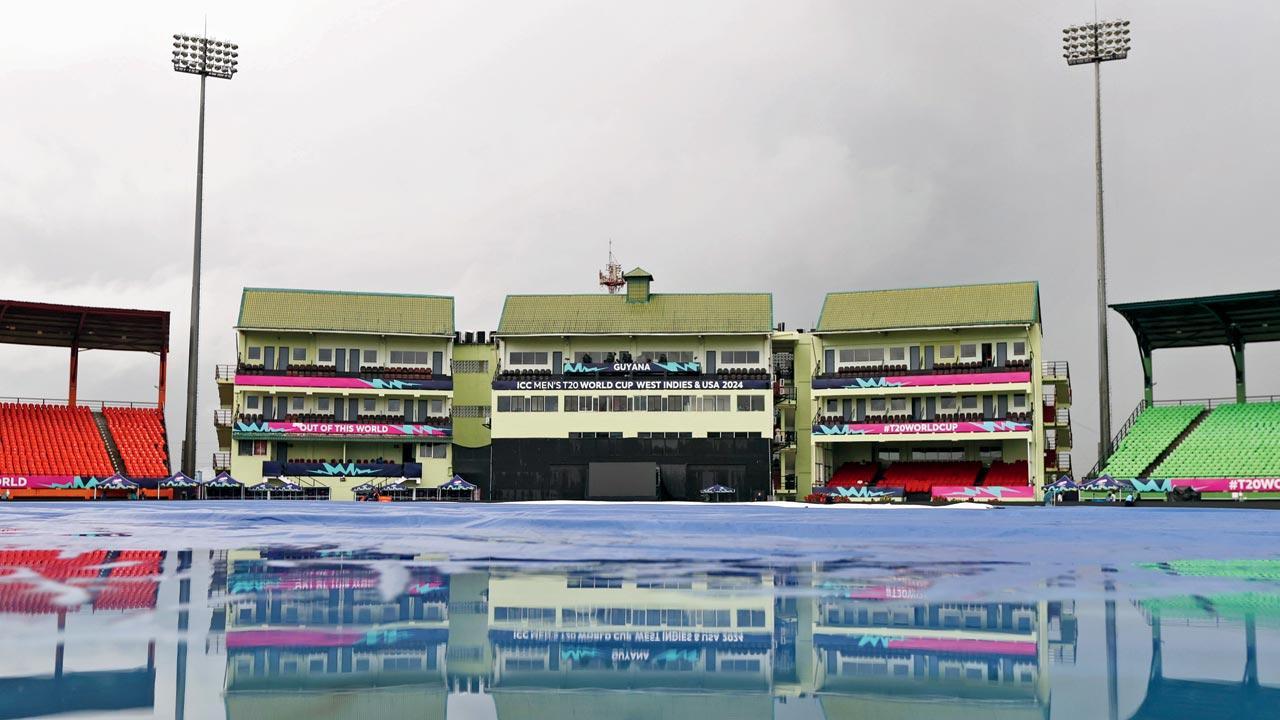The integrity of the tournament was flawed from the moment it was decided India would play the second semi-final in Guyana whether they finished first or second in their group

Heavy rain settles on the covers prior to the T20 World Cup semi-final between India and England in Guyana on Thursday. Pic/Getty Images
 Afghanistan beating Australia and eventually reaching the semi-finals of the T20 World Cup constituted a major upset but it wasn’t a surprise.
Afghanistan beating Australia and eventually reaching the semi-finals of the T20 World Cup constituted a major upset but it wasn’t a surprise.
Afghanistan is a competitive side that made their intentions clear in the 2010 Caribbean T20 World Cup. “We are not here to make up the numbers,” they said and then lived up to that lofty claim. Afghanistan has continued to improve and they are mentally strong. In addition to producing some world-class cricketers, Afghanistan continues to challenge the better teams. This is not always the case with minnows or even some Test playing nations—take Bangladesh for instance.
Bangladesh have threatened improvement at times but they regularly fail at the big hurdles. You could never accuse Afghanistan of being overawed by their opponents.
Australia have refused to play Afghanistan in the past because of their Taliban rules, especially regarding women, which would only add to the satisfaction of beating the former T20 world champions. It also doesn’t help that Australia have a reputation for succumbing against good spin bowling. This is an unwanted flaw that is quickly understood by opposing teams.
Also Read: Exile to excellence! Rashid Khan's evolution into Afghanistan's World Cup icon
Afghanistan then produced a magical win over Bangladesh, albeit it clouded by controversy, to make the semi-finals. The controversy concerned a player’s cramp and brought into focus the position of the coach, in this case former England player Jonathan Trott.
Rashid Khan’s disapproval
A persistent concern of mine around the position of coach is that they can favour their own interests (retaining a coaching contract) over those of the team’s priorities. This appeared to be the case when team captain Rashid Khan made clear his displeasure with the Afghanistan player’s antics.
The important thing was the result as Afghanistan earned their semi-final spot. However, the integrity of the tournament was flawed from the moment it was decided India was playing the second semi-final in Guyana whether they finished first or second in their group. This blatant scheduling bias accommodated the morning start time of the second semi-final which favoured Indian prime time television.
This was further confirmation—if any was needed—that the bottom line is a major deciding factor among cricket’s administrators. Cricket’s financial integrity will continue to be a problem as long the imbalance remains, with India providing at least 70 per cent of the finances.
Afghans prove their strength
Afghanistan’s magical run came to a sudden halt when South Africa avoided their trademark World Cup semi-final meltdown by producing a bowling master-class. They dismissed Afghanistan cheaply and then batted sensibly to enter the final.
In the other semi-final, India proved to be far too strong for England as skipper Rohit Sharma led the team with a typically brave batting performance. The spin bowlers, with the revived Kuldeep Yadav displaying his vast improvement, then dismantled the England batting and India were safely into the final.
The India versus South Africa final is a battle of two unbeaten sides and most importantly the best teams in this competition.
The hope in a major tournament is that the final will feature the two best teams and they then provide a spectacle worthy of the occasion. South Africa have blatantly focused on T20 cricket lately so they’ll claim this is vindication of that policy, but they still have to overcome their bad habit of wilting in major World Cup matches.
A different SA team
If that South African trait continues, India will win comfortably. Nevertheless, South Africa maintain that this team is a different proposition and its captain Aiden Markram has already experienced World Cup success, albeit at the under-19 level in 2014.
India on the other hand, have plenty of World Cup big match experience and a captain in Rohit who has a pedigree of success. Both teams have well balanced pace attacks, but India’s spin bowling is superior.
A lot will depend on the way South Africa react to the pressure of a final. In the compressed nature of T20, a mistake can be terminal and judging by South Africa’s previous World Cup history India are the team most likely to be lifting the trophy.
This was written before the start of Saturday’s T20 World Cup final
 Subscribe today by clicking the link and stay updated with the latest news!" Click here!
Subscribe today by clicking the link and stay updated with the latest news!" Click here!










